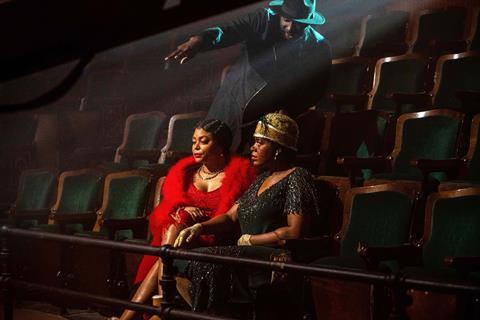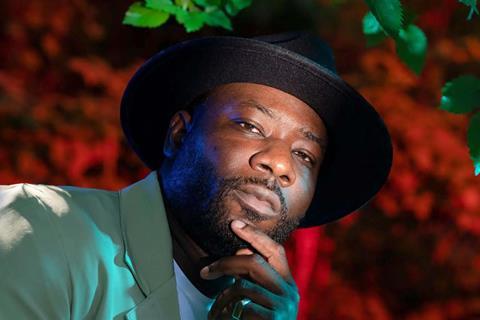Having impressed with 2018 debut feature The Burial Of Kojo and 2020’s Black Is King, Blitz Bazawule now follows in the footsteps of Steven Spielberg with a vivid musical take on The Color Purple. Screen talks to the Ghana-born director.

That Blitz Bazawule was born in the same year Alice Walker’s The Color Purple was published brings a note of fateful destiny to his role as director of its latest big-screen iteration. And while it may be stretching the point to suggest a lifelong ambition has been achieved, the symmetry is still one that amuses the filmmaker, musician and novelist born Samuel Bazawule in 1982 in the Ghanaian capital of Accra.
“You know what? I’m using that!” the 41-year-old chuckles when Screen International remarks on a coincidence that would have doubtless also delighted the beloved grandmother to whom he attributes his interest in storytelling. “She had a phenomenal imagination and told stories that to this day I remember almost verbatim,” he recalls. “They were nonlinear and cyclical in structure and extensions of stories we had heard already, but she always found a new way to tell them. I was very lucky to grow up with her in Ghana, and those nocturnal stories formed the basis for me as an artist and a filmmaker.”
Bazawule insists it should not be surprising that Walker’s epistolary novel about Celie, a poor African American woman enduring spousal abuse in 1900s Georgia, entered his consciousness at an early age. “If you are Black on this planet, you’ve heard of The Color Purple,” he says. “But the first time I interfaced with it was in my English class in college. What attracted me to it back then was it was one of the first pieces of American literature I’d read that had a global view and certainly a view on the continent of Africa. I was truly inspired by the book because it gave this woman growing up in the rural South this globality of Blackness.”
Watching Steven Spielberg’s 1985 film adaptation came later, as did seeing the 2005 Broadway musical version from which the new film of The Color Purple — a Warner Bros title set for US release on Christmas Day — has itself been adapted. By the time Bazawule was approached to direct the film in 2020, the property had been through enough hands for him to know he needed something fresh to offer. “It’s such a massive cultural touchstone that if you don’t have anything real to contribute, you best not touch it,” he says. “But I was fortunate the studio and my producers were open to a radical reimagination from day one.”
A Zoom pitch to those producers — Quincy Jones, Scott Sanders, Spielberg and Oprah Winfrey — was persuasive enough for them to sign off Bazawule’s vision: one in which the everyday drudgery of Celie’s existence is alleviated through vibrant fantasy episodes full of sensuality and colour. “People who deal with abuse and trauma are often miscategorised as docile,” he explains. “Yet nothing could be further from the truth. I think they are constantly calculating ways to escape. Once I figured that out as Celie’s general disposition, it became easy for me to tap into her imagination. The great fortune is it’s a musical, so music was always going to be a segue into those imagined episodes.”
Gaining agency

Raped as a child by the man she calls father, forced to give up the two children that follow and shunted into a loveless marriage to a husband she knows only as Mister, Celie is a victimised figure whose stoicism borders on passivity. (Some have gone so far as to label Walker’s novel Black trauma porn.) Bazawule, though, believes his film gives Celie — played as an adult by Fantasia Barrino, an American Idol winner in 2004 who starred in The Color Purple on Broadway in 2007 — a different way to assert herself. “Whatever Celie imagined, we could give her, and it made her an active participant,” he says. “That gave us the agency the character needed. If we were just playing it on the surface, she would have been very difficult to construct. But once we went past that and got into her head space, she became the controller of her journey.”
Bazawule’s own journey is notable in itself, one that — after an adolescence spent making music and art in his native country — eventually took him to Kent State University in Ohio and a BA in business administration. “It’s down to having African parents who tell you, ‘You’ve got to get a degree!’” he says. “But I’m glad I did — I majored in marketing and advertising, which have been critical in my filmmaking process. I understand acutely what it takes to sell a movie and that’s helped me make choices both behind and in front of the camera. It sounded like a detour when I enrolled, but it’s become a key asset.”
A decade as a musician followed, Bazawule releasing four albums and four EPs under the name Blitz The Ambassador. “I was a rapper in college and ‘blitz’ was how people described my style,” he explains. “My friends would say, ‘He’s blitzing the track,’ and it sounded good so I kept it.”
Ambassador, he goes on, arose from his experience “of travelling the world, building bridges and creating more understanding. Even though I don’t use it anymore, it’s still the work I do.” Another asset, he believes, is his status “as an outsider looking in. When you live in an environment you take things for granted and they stop being special to you. Whether I’m in New York or California or middle America, I see things people who grew up there have perhaps become desensitised to.”
Shooting his own music videos led to Bazawule making his first feature The Burial Of Kojo, a micro-budget drama shot in Ghana with a local crew and novice actors that showcased his flair for striking and poetic imagery. Picked up by Ava DuVernay’s distribution company Array, it became the first Ghanaian film to debut on Netflix and led to Bazawule being selected by Beyoncé to helm her Lion King-inspired visual album Black Is King. That led to The Color Purple, making him, in his own words, “the first Ghanaian to make a major studio motion picture”.
He is wary, however, of assigning too much significance to that achievement. “I don’t celebrate firsts; they’re nothing to celebrate,” he says. “More than anything they’re an indictment of our society on why it has taken this long. But me making this shows young filmmakers they have to believe in their craft. It’s important people see that it’s possible.”
Spielberg’s The Color Purple shares an unfortunate record in being one of two films (The Turning Point in 1978 being the other) receiving the most Oscar nominations — 11 — without a single win. Bazawule, though, will not be drawn on his version’s awards prospects and whether voters will be kinder to it than its predecessor.
“That’s not for me,” says the director, who is currently working on a six-part adaptation of his 2022 debut novel The Scent Of Burnt Flowers for FX. “We made this movie because it needs to exist and because the time is right. If we’re rewarded for it, we’ll be glad, absolutely. But the work is the work is the work, and the excitement for us is people getting to see it.”























No comments yet